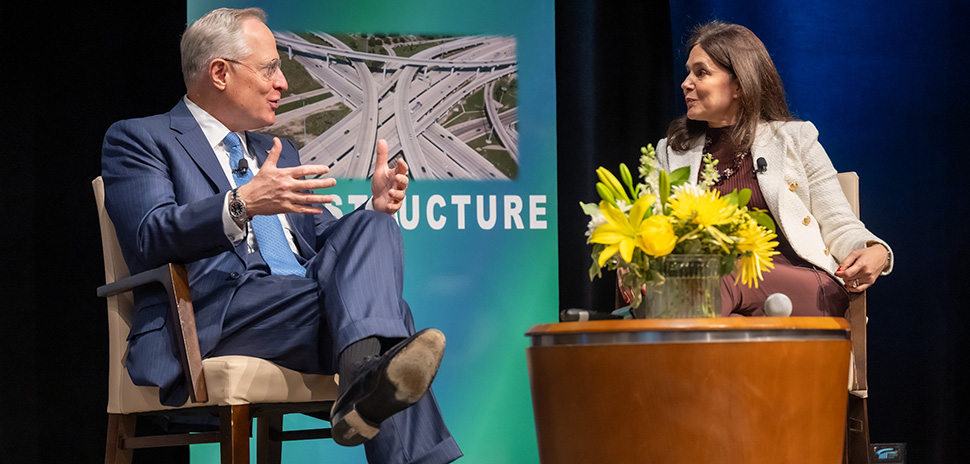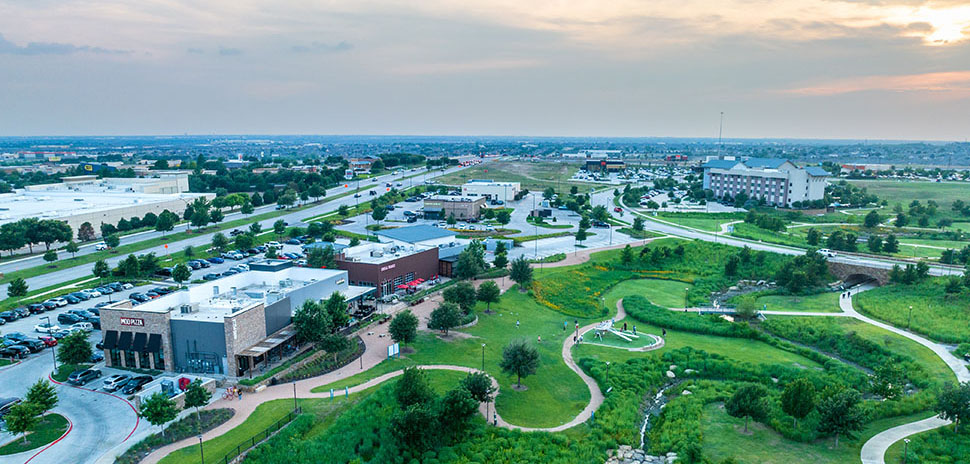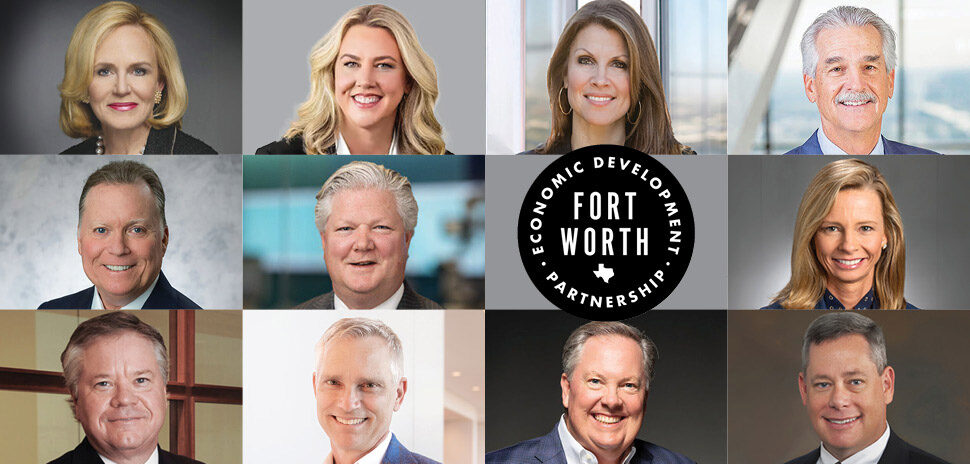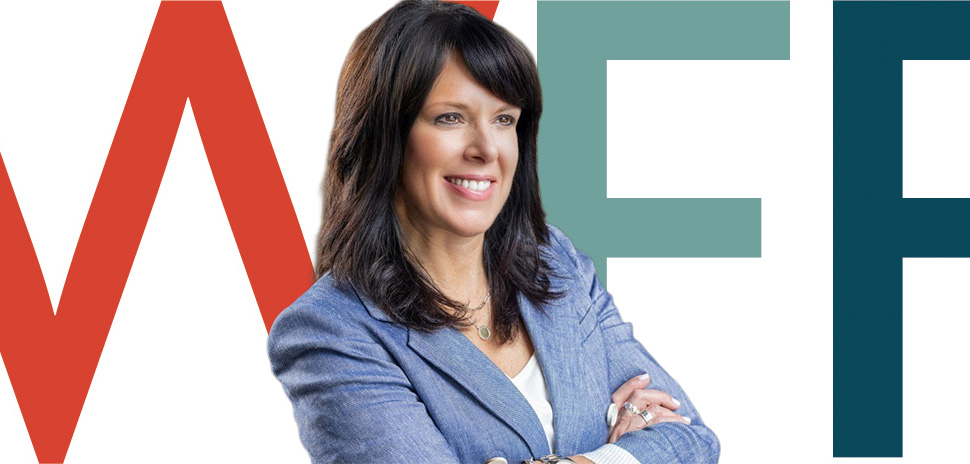Perot Group Chairman Ross Perot Jr., long known for flying clients around in a helicopter to give them a bird’s-eye view of North Texas, was inclined to do the same for Lorie K. Logan, president and CEO of the Federal Reserve Bank of Dallas. But during a keynote conversation with Logan at the 14th annual Tarrant Transportation Summit in Hurst on Feb. 9, the billionaire businessman conceded that won’t be in the cards.
“I’ve wanted to put her in a helicopter and fly her around and show her North Texas, but I don’t think the Fed rules allow her to go fly with me,” Perot joked in front of the summit’s roughly 600 attendees at the Hurst Convention Center. “So, we’re going to be running around in a truck and let her see North Texas from the road.
“Because Michael did such a great job on the roads, that’s easy to do,” Perot said, referring to Michael Morris, transportation director for the North Central Texas Council of Governments. “I tell people, you really don’t need a helicopter in North Texas. The helicopter’s for my clients, but we really don’t need it because our road system is so great.”
Praise like Perot’s for the region’s burgeoning transportation infrastructure—as well as calls for stepped-up collaboration—were often heard during Tarrant County’s 2024 summit, titled “Surge: Readiness for Exponential Population Growth.” In multiple sessions during the half-day program, public-private partnerships were lauded as a key to luring more government funding for transportation projects. Over the long term, participants stressed, continued growth and economic development will depend on thoughtful and innovative transit solutions, including potential high-speed rail projects connecting Fort Worth, Dallas, and Houston.
The region’s population is expected to increase from 8 million today to nearly 12 million by 2050 and, during her talk with Perot, Logan said Dallas-Fort Worth’s “young, skilled, and diverse” labor force is a big reason why. “The continued migration of individuals and businesses into this really energized [Fed] district continues to support economic growth that’s outperforming the nation as a whole,” she said.
The “growth premium” is possible partly because of how “open and welcoming” Texas is, she said. It often takes her 30 minutes just to leave her building, she explained, because she talks to everyone on the way.
“The community, all across the state, is just incredibly welcoming to those who are new. That’s an important cultural attribute to continue to bring people and businesses to the district,” she said. “Another thing is just the entrepreneurial spirit. There really is a can-do attitude about solving problems and really making a difference.”
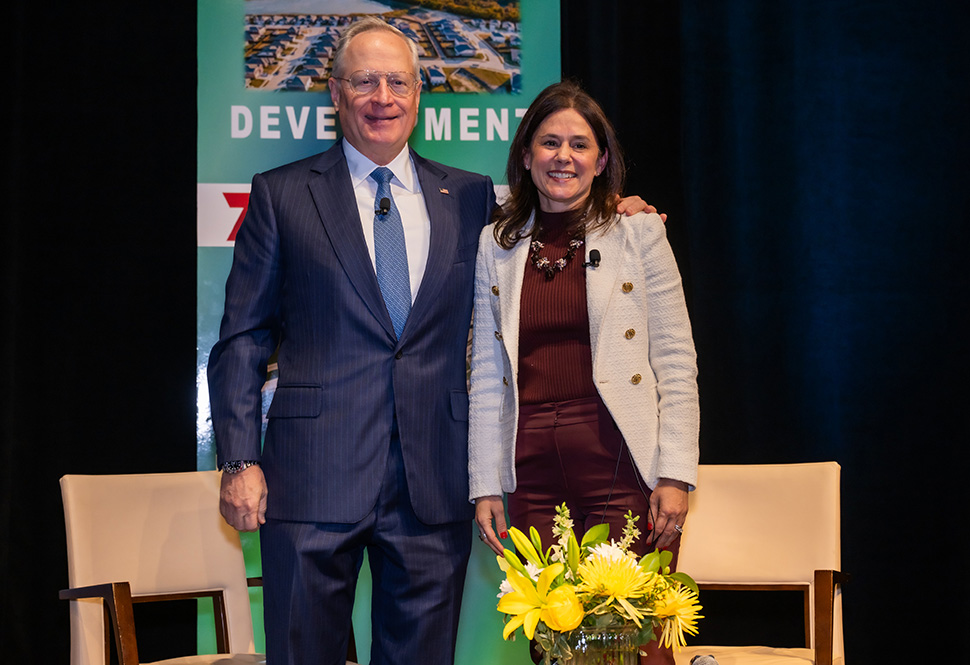
Ross Perot Jr. and Lorie K. Logan at the 2024 Tarrant Transportation Summit in Hurst. [Photo: Debra Hale, Hillwood]
Keeping an eye on supply chain, cybersecurity risks
Logan took over leadership of the Fed’s Eleventh District—it includes Texas, northern Louisiana, and southern New Mexico—in 2022. She previously was an executive vice president of the Federal Reserve Bank of New York, managing the Fed’s multitrillion-dollar securities portfolio and implementing monetary policy as directed by the Fed’s Federal Open Market Committee.
In her conversation with Perot, Logan said the Fed has made “significant progress” in bringing two important inflation measures down below 3%, nearing the central bank’s 2% target for inflation over the longer term. She didn’t mention it, but this was accomplished by raising the central bank’s benchmark “fed funds” lending rate to a 22-year high, triggering interest rate hikes for the likes of credit cards and mortgages in an effort to tamp down prices.
“At the same time,” she added, “we’ve seen solid economic growth, and a labor market that still remains very tight, but is loosening. The risks that I’ve seen in the economy are becoming more in balance, but I do think we need to take time to continue to look at the data, evaluate the incoming data. And I’m really not seeing any urgency to make any additional adjustments to rates at this time, while we get a better understanding and build our confidence whether the progress that we’ve seen in inflation can be sustained over the medium run.”
While the Fed held rates steady when it last met in late January, many analysts are predicting it will start cutting its benchmark rate this year, maybe several times.
Though signs are generally good for the U.S. and North Texas economies, Logan continued, she’s keeping an eye on several risks. One “geopolitical risk and potential spillover” effect involves supply chains, which she believes in the main have “pretty much normalized.” Nonetheless:
- “You could think about unfortunate scenarios that could disrupt supply chains once again, and that could put inflationary pressures back in sight, and the possibility of inflation retrenching. So, we have to be very cognizant of global risks.”
- “Cyber, I think, is another important area of potential risk, both for financial institutions and companies and public institutions as well,” she said. “So, you spend a lot of time thinking about cyber risk and preparations for potential issues. It’s a really important issue … that keeps me up at night.”
One “challenge” the district faces, Logan said, is increasingly unaffordable housing, which disrupts communities by making things more difficult for renters, for example. “Affordable housing is something that was attracting people and companies,” she said. “If we don’t maintain affordable housing, that could constrain the growth that we see.”
Another potential restriction is the availability of childcare, she added. “I’m really thinking about early education, workforce development, and childcare. Those are constraints that limit workforce development, the labor supply, for continuing to grow. Those are areas that are important to us at the Fed.”
Real estate crisis could affect ‘a whole community,’ Perot says
At one point in their talk, Perot, who’s also founder and chairman of the Dallas-based Hillwood real estate development company, asked Logan whether the Fed is worried about the federal budget deficit and the national debt.
Although that’s ultimately the responsibility of elected officials, she replied, keeping track of trends in fiscal policy informs the central bank’s analysis of the overall economy. “A key point I am always thinking about with respect to fiscal policy is—I think it’s fair to say—that we’re on an unsustainable trend. And I think it’s a really important issue that our elected officials [need to] remain focused on, because … it has been a key factor in capital continuing to come to the United States.”
In an interview with Dallas Innovates after their conversation, Perot expanded on his concern about the federal debt and deficit (a concern that also was famously shared by his late father).
While the economy may look good in the short-term, Perot said, it was too much government spending that led to inflation, the higher interest rates the Fed imposed to control it, and the economic pain many are feeling today.
“You can’t spend this kind of money and not have a problem,” he said, pointing specifically to the $2 trillion American Rescue Plan, which became law in 2021. “And we are so grossly overspending. We’re going to pay the piper someday.”
Can anything be done about it in the meantime? “It’s going to take a very strong leader that calls for sacrifice to the American people,” Perot said. “We’re in so much better shape than the world, but we’re going to need 10 years of sacrifice, and we’ll be back in great shape. But no one’s going to call for it.”
Higher interest rates have also contributed to a looming crisis in the commercial real estate industry, experts say, with widespread declines in commercial property prices and values resulting in more loan defaults and less revenue for municipalities. “The appraisals are going down, the tax revenues are going to go down,” Perot agreed. “So, it’s not just an office building developer—it’s a whole community that will feel the pain of a drop in real estate values. … It will be painful.”
Sponsors of the Tarrant Transportation Summit included Presenting Sponsors Cintra and TEXpress; Title Sponsors Hillwood and Tarrant County Precinct 3 Commissioner Gary Fickes; and Platinum Sponsors BNSF Railway, DEC (civil engineering), the Tarrant Regional Transportation Coalition, and the Fort Worth Business Press.
![]()
Get on the list.
Dallas Innovates, every day.
Sign up to keep your eye on what’s new and next in Dallas-Fort Worth, every day.

